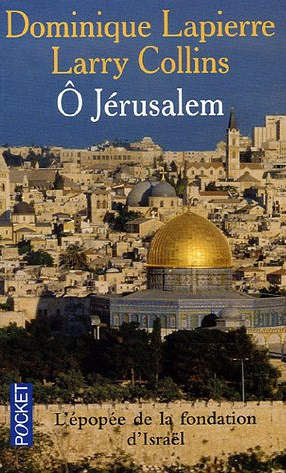

“For the Arabs, and the above all for the 1.2 million Arabs of Palestine, the partitioning of the land in which they had been a majority for seven centuries seemed a monstrous injustice thrust upon them by white Western imperialism in expiation of a crime they had not committed. With few exceptions, the Jewish people had dwelt in relative security among the Arabs over the centuries. The golden age of the Diaspora had come in the Spain of the caliphs, and the Ottoman Turks had welcomed the Jews when the doors of much of Europe were closed to them. The ghastly chain of crimes perpetrated on the Jewish people culminating in the crematoriums of Germany had been inflicted on them by the Christian nations of Europe, not those of the Islamic East, and it was on those nations, not theirs, the Arabs maintained, that the burden of those sins should fall. Beyond that, seven hundred years of continuous occupation seemed to the Arabs a far more valid claim to the land than the Jews' historic ties, however deep.”
― Larry Collins, quote from O Jerusalem
“In Jerusalem, as elsewhere in Palestine, the Haganah's basic strategy reflected a philosophy propounded by David Ben-Gurion. What the Jews had, they must hold. No Jew was to leave his home, his farm, his kibbutz, his office without permission. Every outpost, every settlement, every village, no matter how isolated, was to be clung to as though it were Tel Aviv itself.”
― Larry Collins, quote from O Jerusalem
“our investigation led us to discover was that at the peak of the battle the Jewish soldiers owed their success less to their courage than to the sudden arrival of a most unusual ally: a swarm of bees, infuriated by the smell of gunpowder, descended on the helpless Arab legionnaires and forced them to abandon their dominating position above the monastery.”
― Larry Collins, quote from O Jerusalem
“Heirs to the philosophy of a Zionist zealot named Vladimir Jabotinsky, they clung to the dream of a Jewish state running from Acre to Amman, from Mount Hermon to the Suez Canal. For them, Churchill's decision to create the emirate of Transjordan with a stroke of his pen on a Sunday afternoon in Cairo had been a mutilation of the Balfour Declaration. They wanted it all, all the land that had once belonged to the Biblical kingdom of Israel, and they wanted it, if possible, without the encumbering presence of its Arab inhabitants.”
― Larry Collins, quote from O Jerusalem
“Their excesses were largely responsible for the anti-Jewish sentiment which permeated the British forces in Palestine. Those excesses had produced other fruits, however. They had helped disgust the British public with Britain's role in Palestine, and thus played an important role in leading Clement Attlee to his decision to leave.”
― Larry Collins, quote from O Jerusalem

“Arab-Jewish relations in the Old City had always been good. Most of the property in the quarter was Arab-owned, and one of its familiar sights was the Arab rent collector making his way from house to house, pausing in each for the rent and a ritual cup of coffee. Here the Islamic respect for men of religion had been naturally extended to the quarter's scholars in their yeshivas. As for the quarter's poor artisans and shopkeepers, the most natural of bonds, poverty, tied them to their Arab neighbors.”
― Larry Collins, quote from O Jerusalem
“Lord can restore a covenant with Israel and yet continue”
― Jack Miles, quote from God: A Biography
“The memory was so vivid that, like a fresh scab, he was sure he would start to bleed if he picked at it.”
― Miyuki Miyabe, quote from Brave Story
“But you have to live in the present. You have to take the old and make it new -- that's my point.”
― Lauren Myracle, quote from Peace, Love, and Baby Ducks
“That was the problem with reading: you always had to pick up again at the very thing that had made you stop reading the day before.”
― Nicholson Baker, quote from The Mezzanine
“I snapped off a knobby twig from a shrub at my heel and pulled it back into a messy bun.”
― Penelope Fletcher, quote from Demon Girl
BookQuoters is a community of passionate readers who enjoy sharing the most meaningful, memorable and interesting quotes from great books. As the world communicates more and more via texts, memes and sound bytes, short but profound quotes from books have become more relevant and important. For some of us a quote becomes a mantra, a goal or a philosophy by which we live. For all of us, quotes are a great way to remember a book and to carry with us the author’s best ideas.
We thoughtfully gather quotes from our favorite books, both classic and current, and choose the ones that are most thought-provoking. Each quote represents a book that is interesting, well written and has potential to enhance the reader’s life. We also accept submissions from our visitors and will select the quotes we feel are most appealing to the BookQuoters community.
Founded in 2023, BookQuoters has quickly become a large and vibrant community of people who share an affinity for books. Books are seen by some as a throwback to a previous world; conversely, gleaning the main ideas of a book via a quote or a quick summary is typical of the Information Age but is a habit disdained by some diehard readers. We feel that we have the best of both worlds at BookQuoters; we read books cover-to-cover but offer you some of the highlights. We hope you’ll join us.